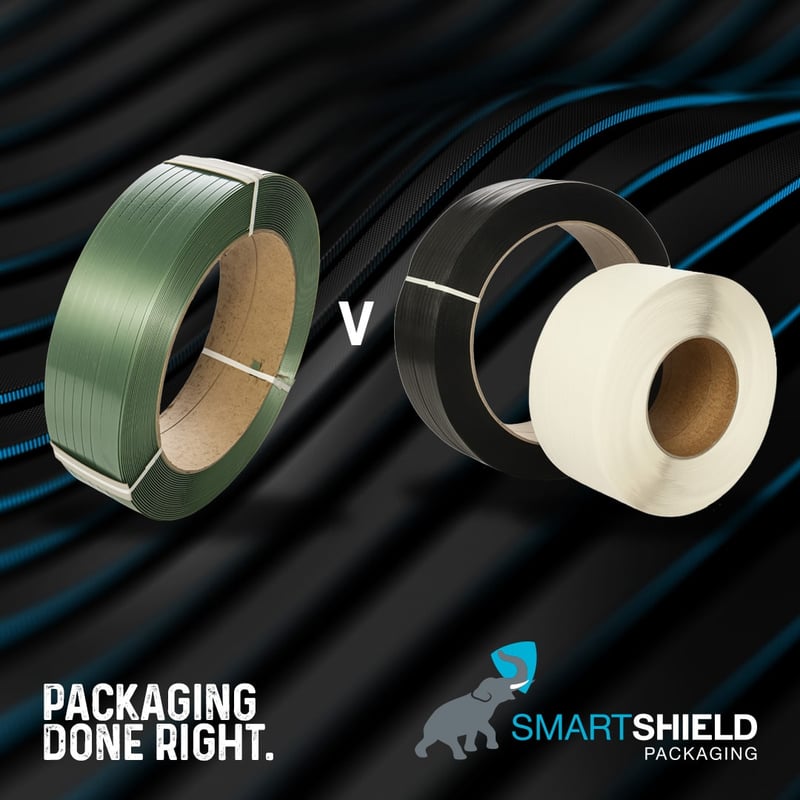Polyester vs. Polypropylene Strapping: Which should you choose?
Polypropylene and polyester strapping - both hardy, go-to strapping options, used to secure and contain valuable goods in transit.
But which one should you be using?
In this blog, we’re going to lay out the case for each! So, without further ado, let's dive in.
What’s the Difference between Polyester vs. Polypropylene?
On first appearances, the differences between polyester and polypropylene strapping are obvious. Polyester strapping traditionally has a smooth, glossy appearance, and comes in green, while polypropylene comes in a spectrum of colors, usually with an embossed texture.

The real difference, however, lies in their material properties and applications. While polyester strapping is strong and doesn’t stretch much, making it ideal for heavy-duty applications, polypropylene is flexible and stretchy and commonly used for lighter-duty applications
The two have their similarities, too. Just in the same way our cell phone batteries drain faster in the cold, both polyester and polypropylene strapping lose effectiveness when exposed to extreme temperatures or UV rays.
.jpg?width=1080&height=1080&name=PP%20hand%20%26%20machine%20strap%20(with%20SS%20Logo).jpg)
Why choose Polypropylene Strapping?
For those seeking a lightweight, cost-effective solution without compromising on durability, polypropylene strapping - familiarly known as poly strapping or P/P strapping - reigns supreme.
It’s used widely for light to medium-duty applications such as baling, carton closing, and securing lightweight pallets.

It’s also resistant to liquids and most corrosives, meaning it’s ideal for packaging applications where protection against moisture and chemical exposure is important.
Whether applied with plastic or metal buckles, or even metal seals, polypropylene strapping adapts easily to various strapping tools, including manual, friction weld, or fully automatic machines. Its flexibility also means it conforms to irregular shapes and absorbs shocks without faltering.

What is polypropylene strapping used for?
✔️Light to medium-duty palletizing - offering cost-effective containment and stability while on the road
✔️General packaging - widely used to bundle cardboard boxes, corrugated cartons, and other lightweight packages for storage or shipment
✔️Automotive and parts manufacturing - used for bundling components, parts, and accessories during production, assembly, and the distribution processes, and thereby complimenting efficient inventory management and logistics
✔️Retail and distribution - used for securing merchandise on pallets or creating multi-item bundles
✔️Food and drink industry - bundling cardboard trays, plastic bottles, and canned goods for safe handling and distribution
✔️Textile and clothing packaging: used by retailers and manufacturers to bundle rolls of fabric, clothing items, and accessories
✔️Newspapers and magazines - used in printing facilities and distribution centers for bundling stacks of newspapers and magazines and enabling efficient handling and delivery to retailers
✔️Lightweight furniture - used to secure flat-packed items and bundle packages for retail sale
✔️Pharmaceutical and healthcare products - used for bundling supplies, products, and equipment, to ensure secure containment and adherence to safety standards
✔️E-commerce and fulfillment centers - securing parcels, packages, and boxes during shipping and delivery

Why choose Polyester Strapping?
Step aside, steel strapping – polyester strapping (also known as PET strap) is here to challenge you. Available in a wide variety of widths and strengths, and known for its rigidity and superior breaking strength, polyester stands as a worthy alternative to steel strapping.
Unlike its stretchier counterpart - polypropylene - polyester's low elongation properties ensure prolonged tension retention, while its excellent recovery capabilities absorb heavy impacts with ease, too.
Paired with metal serrated seals and a range of manual or friction weld sealless combination tools, polyester strapping stands strong in the most demanding of packaging scenarios.

What is Polyester strapping used for?
✔️Heavy-duty palletizing - offers excellent strength and stability during transport and storage
✔️Brick and block securing - thanks to its high tensile strength, it offers super-reliable containment and stability for heavy construction materials
✔️Timber and lumber bundling - used to secure large quantities of timber and lumber for transportation, preventing shifting and damage
✔️Metal and steel - used in the industry to bundle and secure metal sheets, coils, pipes, and other heavy metal products, ensuring safe handling and transit
✔️Crate and case closure - manufacturers and exporters use it to seal and reinforce wooden crates, plywood cases, and other packaging containers, providing added security for fragile or valuable contents
✔️Brickyard and tile manufacturing - these facilities rely on it to bundle and secure finished products, facilitating efficient storage and transportation within the production facility or to distribution centers
✔️Appliance and furniture packaging - used to ensure items remain intact and stable throughout the journey, whether international or domestic
✔️Paper and printing - paper mills and printing facilities use it to secure rolls of paper, magazines, newspapers, and other printed materials
✔️Recycling and waste management - it’s also used for baling cardboard, plastics, metal scraps, and other recyclable materials, facilitating efficient storage and transportation to recycling facilities

To sum up…
While both materials offer packaging prowess, polyester excels in strength and resilience, while polypropylene provides versatility and affordability.
In the ever-evolving world of packaging, the choice between polyester and polypropylene strapping is not just a matter of preference but one of practicality. With SmartShield by your side, rest assured, your packaging needs are in expert hands - and you can call us whenever you need extra support or advice.
Why Choose SmartShield?
We take pride in our commitment to delivering packaging solutions that exceed expectations. With a dynamic team of young, passionate professionals, we work with our customers to ensure they get the most cost-effective product that best suits their application.
Ready to elevate your packaging game?


